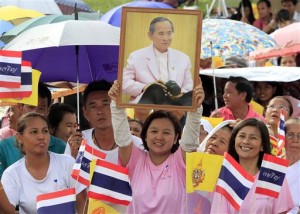Calls grow for reform of strict Thai royal insult law

Thousands upon thousands of Thais turned out on May 25, 2012, in Bangkok and the historic capital Ayutthaya to show their devotion to the country's 84-year-old monarch on his first trip outside Bangkok in almost three years. A petition signed by almost 27,000 people, urging reform of Thailand's strict royal insult law was submitted to parliament Tuesday, May 29, 2012, campaigners said, amid growing clamor for the rules to be changed. AP PHOTO
BANGKOK—A petition signed by almost 27,000 people urging reform of Thailand’s strict royal insult law was submitted to parliament Tuesday, campaigners said, amid growing clamor for the rules to be changed.
The large collection of signatures is the first of its kind calling for amendments to the controversial lese majeste law, according to petition organizers the Campaign Committee for the Amendment of Article 112 (CCAA).
Scrutiny of the law, which carries a 15-year jail term for each count of insulting the king, queen, heir or regent, has intensified since the death of a 62-year-old Thai man this month while serving a 20-year sentence for committing lese majeste.
His death renewed calls for reform, with critics saying the law is used as political tool to stifle free speech.
The influential Nitirat group of Thai legal experts has also galvanized public opposition to the section 112, as it is known, urging authorities to prosecute fewer people and cut sentences.
Article continues after this advertisement“A letter with 26,968 signatures together with draft amendments (proposed) by the Nitirat group has been submitted to parliament for the first time ever,” Pueangthong Pawakapan, of the CCAA, told AFP.
Article continues after this advertisementShe said around 200 people had gathered to present the petition to parliament.
Thailand’s parliament is not obliged to debate the petition and political parties have so far resisted reform, with Prime Minister Yingluck Shinawatra recently ruling out pushing for an amendment.
The royal family is a hugely sensitive subject in politically turbulent Thailand, where 84-year-old King Bhumibol Adulyadej is revered as a demi-god by many Thais.
The world’s longest-reigning monarch has been in hospital since September 2009, although he made a rare trip out last week leaving Bangkok for the first time in more than two years to briefly visit the ancient capital of Ayutthaya.
Thailand expert Paul Chambers of the Payap University in Chiang Mai said the size of the petition represents a “symbolic victory” for the law’s opponents, particularly as the signatories joined ranks despite fears of prosecution.
“The campaign to amend the law is clearly just: the law stifles free expression; imprisons people for the faintest of evidence; and has been used as a political tool to counter political foes,” he added.
The issue is likely to surge to the top of the agenda on Wednesday when a Thai criminal court is expected to rule on the case of a web editor accused over remarks about the monarchy posted by other people on her website.